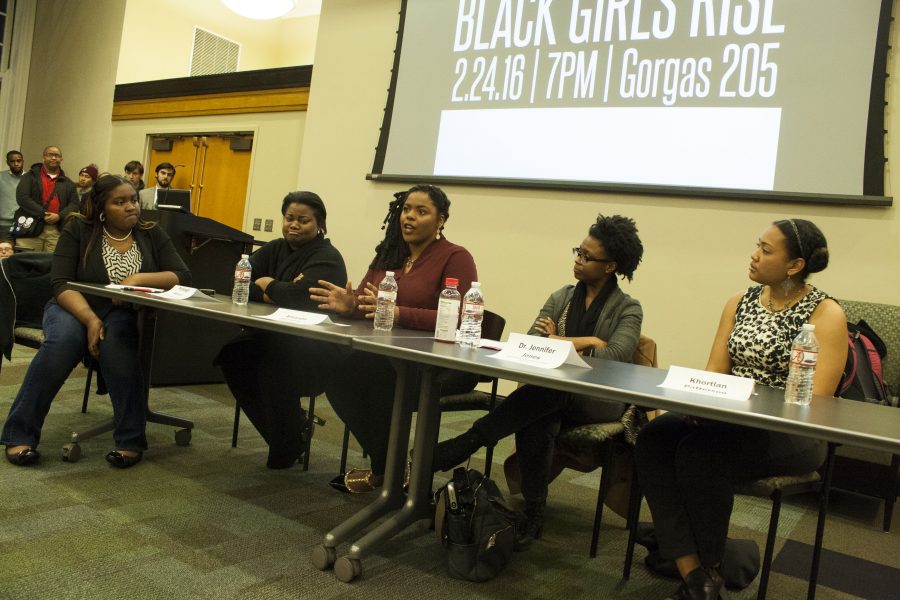In front of a packed house in Gorgas Library Room 205 the University of Alabama Feminist Caucus, UA Blend and Collegiate 100 Black Men hosted the “Black Girls Rise” panel discussion.
The panel on Wednesday discussed the intersection of gender and race, and how they affect black women in society, misogynoir, colorism and misconceptions surrounding black feminism.
The panelists included Professor Montré Carodine, a professor in the UA School of Law; Amanda Bennett, a senior double majoring in English literature and African American studies and a co-founder of the We Are Done movement; Jennifer Jones, an assistant professor in the department of gender and race studies; and Khortlan Patterson, a senior double majoring in African American studies and religious studies with the UA Honors College. Jessica Morgan, chair of finances for the UAFC, moderated the discussion.
The discussion began with Morgan asking the panel to establish what womanism and black feminism is.
“Womanism is a term that was coined by Alice Walker in the 1980’s and during the 1990’s there was a split between the secular ideas of womanism and the more religious idea of womanism,” Bennett said.
Bennett then spoke some on the secular aspect while Patterson focused on the religious connotations.
“It was the idea that feminism as itself in the sixties, and now, and things like that were not really addressing the community needs of African American women, and particularly needs of sexuality and identifying the trope of the mammies, the jezebels, the sapphires and things like that,” Bennett said.
Patterson then referenced a text that analyzed the idea of womanism and how black women could use it to access God.
“So to the aspect of the religious connotations of womanism, there was a text called ‘Sisters in the Wilderness’ and it really analyzed the idea of womanism and how black women could use the story of Hagar to really be an example of how black women can access God and to access him in their own personal way that’s not influenced by different structures that surround them and place them in roles of surrogacy,” she said.
Morgan then shifted focus to misogynoir and the issues of colorism and how they affect black women in the black community by asking the panel to define what they mean.
Misogynoir, Jones said, is a way of articulating the particular nature of sexism and racism experienced by black women.
The panel then tied misogynoir and colorism together.
“Pretty much, colorism in the black community is an internalization of white beauty norms whereas black women are considered more beautiful with longer hair, straighter hair,” Carodine said. “It’s a really painful thing and I think we’ve all experienced it to some extent.”
Carodine said that colorism also has a way of affecting black women’s access to power in society.
“It’s a really tough thing to discuss, but it very much exists within the black community and I do think that it is something that makes a real difference for some black women in terms of access to power, quite frankly, jobs, money and status,” she said.
Patterson then spoke about her own experiences with colorism through her time in school. She attended a private high school where she was mostly around white children so she said she didn’t want to wear her hair naturally. She said that when she straightened her hair she felt accepted. But when she came to the University, she said other black women would touch her hair and tell her “it’s like white girl hair.” She said that people started to ostracize her and formed negative opinions about her as a person.
“In our black community we trace a woman’s value to her attractiveness because of hegemony, which is the internalization of values,” Bennett said. “The closer to white you are, the more valuable you are and the closer to dark you are, the less valuable you become and to almost at the far end of the spectrum you become less human, and that’s one of the other consequences of misogynoir.”
Morgan then wanted the panel to tackle the issue surrounding mental illness and the image of the “strong black woman.”
Jones, who has struggled with anxiety and depression since she was a teenager, said that the image is obscured and there’s an “intense” stigma surrounding it.
“I think historically the trope of the strong black woman has been one that’s obscured and has made it much more difficult for black women to come forth and say ‘hey, I’m struggling’ or ‘hey, I need counseling’ or ‘hey, I need some kind of assistance,’” she said. “It’s this idea that black women are supposed to sort of weather all, and that, when we get weary and tired, you just pray about it or talk to your girlfriend. In my personal experience, I do think there is an intense stigma for black women to get mental health counseling.”
At the conclusion of the discussion the panel engaged with the audience and answered questions.









